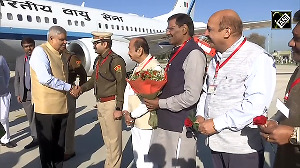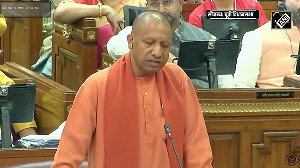The civil-military imbalance in Islamabad is a key factor impeding India-Pakistan relations despite a large constituency for peace in both countries, former Indian Minister Shashi Tharoor said in Islamabad on Thursday.
The dominant role played by the security establishment in shaping Pakistan's foreign policy and the powerful military's long-standing links with jihadi groups are issues that will have to be addressed to put the bilateral relationship on an even keel, Tharoor said.
Speaking on the theme, India and Pakistan: Cooperation or conflict, at an event organised by the Jinnah Institute, a leading think tank, Tharoor noted that elements in Pakistan had for long sponsored terrorists and jihadis as part of a policy meant to "bleed India" while compensating for the asymmetry in conventional forces.
The Pakistan Army was one of the most "lavishly funded" armies of the world and has a "stranglehold over policy" while no elected civilian government had ever completed its term, he pointed out.
It was not in Pakistan's interests for the army to get a "grossly disproportionate share" of the GDP and the budget, said Tharoor, who arrived in Lahore on Tuesday on a four-day Pakistan visit.
"The army lays down the red lines that political leaders dare not cross," he said. The army also preserves the "myth of an Indian threat", the former minister of state for external affairs underlined.
This civil-military imbalance made people in India wonder whether the government was doing the right thing by holding talks with a civilian administration in Pakistan that neither controls nor launches militants for terrorist attacks, he said.
Each terror attack, he said, undermines the minority who believe peace is possible.
People in India also questioned whether the Pakistan Army would agree if a civilian dispensation decided that India is not a threat, Tharoor remarked.
In this regard, he said peace overtures made by President Asif Ali Zardari shortly after he came to power and the army's negative reaction to them showed that the President "went farther than the army was willing to allow him to".
Pakistan's policy of "strategic depth" in Afghanistan and any efforts to wrest Kashmir from India too are not in Islamabad's interests, he said.
At the same time, Pakistan was suffering due to its policy of financing and training jihadis for 20 years as the terrorists were now targeting military establishments like the army's General Headquarters and a naval airbase in Karachi, he said.
Addressing Pakistan's concerns about India, Tharoor said the people of India were "totally reconciled to Pakistan's existence as an independent state" and no one believes that the events of 1971 -- which led to the creation of Bangladesh -- can be replicated.
He noted that the 1971 war was a "special case" precipitated by a Pakistani crackdown on the people of erstwhile East Pakistan.
Answering questions from the audience after his speech, Tharoor made it clear that India had neither the intention nor capability to foment unrest in Balochistan.
A strong and stable Pakistan was in India's interest, he said. India was essentially a "status quoist" country and there could be peace between the two sides if they agreed on "mutually acceptable parameters", Tharoor said.
While terrorist groups have a momentum of their own and cannot be turned off like a tap, Pakistan and India can focus on softer issues like a free trade pact and educational exchanges to improve relations, Tharoor noted.
He also called for greater interaction between India and Pakistan on Afghanistan, where an "unhealthy sense of competition" had developed. Though both countries were often on opposite sides, a stable, moderate and functional Afghanistan was in the interest of both sides, he said.
In response to a question on the failure by both sides to reach an agreement to end the military standoff on the Siachen glacier, Tharoor acknowledged that there had been a
"hardening" of the Indian stance after Pakistan-backed infiltrators occupied strategic heights in Kargil in 1999.
There were fears that a unilateral withdrawal by Indian troops would be taken advantage of, he said.









 © 2025
© 2025